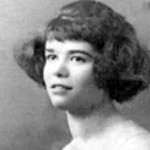Marian Arkwright

Marian Ursula Arkwright (1863 – March 1922) was an English composer.
Life[edit]
Marian Arkwright was born in Norwich, Norfolk, England, and received a doctorate in music at Durham University,[1] one of the first English women to do so.[2] After completing her studies, she worked as an orchestral musician and composer and conducted orchestras including the Newbury Amateur Orchestral Society. She served as secretary of the English Ladies' Orchestral Union.[3] She received a prize from The Gentlewoman for an original orchestral work The Winds of the World.[4]
Her brother was the musicologist Godfrey Edward Pellew Arkwright.
Works[edit]
Arkwright was noted for unusual instrument combinations. Selected works include:
- Quintet for piano, oboe, clarinet, horn and bassoon
- Trio for piano, oboe and horn
- Trio for pianoforte, oboe and viola
- Scherzo and Variations for piano, clarinet and bassoon
- Rêveries for piano, oboe and viola
She published three volumes of violin and piano duets and two Concert Pieces for viola and piano.[5] She took an interest in folk music and her Japanese Symphony contained airs that she had noted down herself.[1]
She died unexpectedly in March 1922.[3]
References[edit]
- ^ a b Lucy Broadwood, "Obituary Marian Ursula Arkwright", Journal of the Folk-Song-Society. Vol. 7, Nr. 26, December 1922, p. 27
- ^ "Success of British Women Composers". Ottawa Citizen. 1 June 1922. p. 4. Retrieved 8 April 2019 – via newspapers.com.
- ^ a b "Notes From Far and Near". Ottawa Citizen. 22 July 1922. p. 16. Retrieved 8 April 2019 – via newspapers.com.
- ^ The Monthly musical record, vol. 36, 1906, retrieved 11 November 2010
- ^ "Marian Arkwright, Bluebell Kean, Margaret Meredith and Ethel Barns: Chamber Works". Originally published in The Music Student Chamber music supplement July 1914 pp.97-8. Retrieved 10 October 2010.
